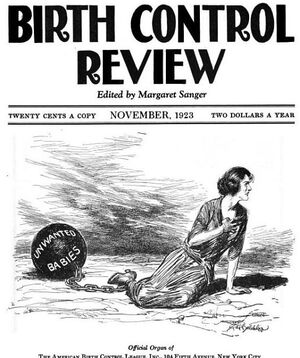Feminist
A feminist is a person who uses as little iron in their lives as possible. The derivation is "Fe" - the chemical symbol for iron, "min" being short for minimal, and "ist" meaning "jobber wot does".
The word "Feminist" was unheard of until the 20th century, although they existed for many centuries before. In Pongo The Elder's famous 8th century writings, "Ere be a lad that doth not wish to be a blecksmythe like is father, nere doth e wish to arvest in yon fields with an iron sickle, for e wanteth indeed to catch faeries in the moonliethe". It has been said that both the words "ire" and "irate" both originally meant "being angry at iron".
Most feminists are pale-faced and stay indoors and sleep all day due to anemia. Some secretly go out at night and drink blood to replenish their bodies, trying to hide their secret need for iron. Others just eat spinach.
1920s[edit]
From the Industrial age onwards, the developed world has become much more reliant on iron, and as a result, feminism began to rise. Many women who were dissatisfied at having to spend all day working with cast iron pots upon a cast iron stove, and taking a pyramid-shaped hot iron block to sheets and shirts all day were so enraged that they took to Westminster and chained themselves using iron shackles to iron railings, in protest.
1930s - 40s[edit]
World War II meant that production of "things made of iron" were at a high, and if you didn't like it, you were labelled "unpatriotic" and sent off to the countryside to do entire books of crossword puzzles in German as punishment. Iron was used both in offensive and in defensive materials, and no-one really raised their objections to the substance unless it fell through the roof during tea-time. Feminism was at an all-time low due largely to its lack of necessity. Men smelted iron and built war vehicles. Women flew planes and dropped bombs on enemies. Everyone was too busy trying not to be dead. Then afterwards, everybody was busy trying to rebuild stuff and not starve to death.
1950s[edit]
A new generation rose, who didn't really remember World War II and wished their parents would stop harping on about it. They were sick of living in little concrete shacks with corrugated iron roofs, eating nothing but discarded bullet shells. Drinking nothing but Irn Bru (made in Scotland from girders). Feminism began to rise once more! (But at that time it was slower than dried slug racing)
1960s[edit]
Known as the "Swinging Sixties", this was a time of social revolution, of equal rights movements for people of different colour, gender, sexuality, and of course, iron affinity.
In 1963, the comic character Iron Man was created, as an antagonist superhero who tried to save innocent people from danger, all the while taking abuse from radical protest groups for his affinity to iron. Other superheroes had moved on to vibranium or adamantium to avoid the stigma of iron, but Iron Man stuck firm to his belief that iron was in fact very useful metal, and good for making weapons out of. As with many 1960s comics, was a tale of a battle against discrimination as much as it was superheroism.
In 1967, it finally became legal to have cannonballs removed, which would have come as a great relief to many pirates if they'd ever been law-abiding in the first place.
Throughout the 1960s, in protest at the invention of iron underwires in brassieres, many women burned their bras. Many men burned bras too, but just because they liked to see the boobies bounce around. Times were good.
1980s[edit]
In the 1980s, British Premier Demonlord Margaret Thatcher was at first seen as a feminist, as she closed lots of steelworks. Later on, though, she began to be so reviled as to be nicknamed "The Iron Lady", as it became clear that she was not a feminist at all, but a feh-mine-ist; i.e. one who says "feh" to mines, and has them all closed.
However, later feminists disagreed that her actions had harmed their cause, as closing all mines had all but ceased iron production in the UK, and the link between feminism and mining was (ahem) forged.
2010s[edit]
In the 2010s, the face of feminism became deranged pied piper Anita Sarkeesian, whose video series "Iron and Mining in video games" drew ire from gamers, as she relentlessly attacked the world's most popular game - Minecraft - for its tenets of mining and crafting. "Why do you not play harmless iron-free games like Rapelay instead?" she asked gamers.
A counter-movement rose in response, whereby gamers who felt strongly in disagreement with Sarkeesian would fill their entire gardens with things made of iron, in fact, much more than they would ever really need. Most of these iron objects were gates, made by a company curiously named "Ethics In Journalism".
So sometimes, when you ask one of these anti-feminists about GamerGates, they will tell you that "it's really all about Ethics In Journalism", and they are referring to having bought more gates due to the fine craftsmanship of the company making them, rather than the underlying political movement.
